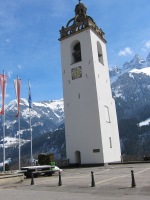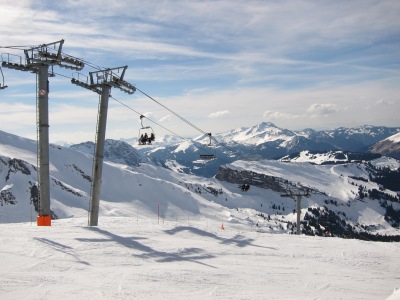
“Make love to the snow with your feet.” An instructor (Italian, of course) had once dispensed that advice about skiing in a whiteout. Like the snowy one that envelops my husband, Peter, and me at 6,900 feet on a mountain in Switzerland. Or maybe we’re in France… As I said, I really can’t see.
Nor can my legs beguile the blizzard into submission. Lost in the white vortex, I tumble into an unseen snowdrift.

The flip side to a blizzard–the yin to tempestuous yang–is the powder playground the following day. Peter and I awaken to snow dusting wooden chalets and an 18th-century church with a steeple shaped like a crown. Even better, two feet of silvery fluff mounds on slopes above town. On every ski run, we etch fresh tracks in buffed drifts.

We’re based in Champéry, a 700-year-old village cocooned in a narrow valley that looks a wintertime set for The Sound of Music–Part 2. The mountains looming above us are the Alps. And my topographic tizzy–am I in Switzerland? France?–comes because we’re skiing Portes du Soleil–arguably the world’s largest ski area.
Whistler Blackcomb, the biggest ski area in North America, holds two mountains and 13 square miles of terrain. Portes du Soleil (which translates as “gateway to the sun”) encompasses nearly 150 square miles and several mountain ranges.
Twelve interlinked resorts sprawl between Mont Blanc in France and Lake Geneva in Switzerland. Four ski areas lie on the Swiss side and eight on the French. All can be accessed with one affordable lift pass.

With nearly 300 ski runs stretching for 400 miles, skiers and boarders can explore for a week and never carve the same route twice. Despite the vastness, it’s easy to schuss from country to country, thanks to trail signs that point in the direction of each resort–Champéry, Les Crosets, Morzine, Morgins, Avoriaz, and so on.
Nearly 80 percent of the marked runs are easy to intermediate. But off-piste offers precipice-practising experts the opportunity to hurtle from cornices into gravity-defying couloirs.
With so many choices of where to ski, Peter and I streamline decision-making into a simple question: What do we want for lunch? A steak-frites (grilled steak with fries) on the French side, or raclette (melted cheese on potatoes) on the Swiss side? The region holds 90 restaurants, many of them occupying former chalets d’alpages–alpine huts.
One sunny morning, we decide to circle through the Swiss villages. From the 7,000-foot heights of Pointe de Mossette, we enjoy stunning views of Les Dents-du-Midi, seven adjacent summits that resemble giant teeth (dents).

A series of lifts and intermediate trails through pine-y woods leads to the petite burg of Champoussin and La Ferme à Gaby, a restaurant famous for artisanal cheeses. The cheese maker tells us that when he tastes the milk, he knows whether the cows and goats have grazed on the sunny or shady side of the mountain.
This being Europe, we indulge in wine with our lunch. Swiss wines are as big a secret as the names behind those numbered bank accounts in Zurich. “Switzerland is too cold, too snowy, too high,” many wine lovers think. But vineyards have been cultivated in the region for more than 2,000 years.
Peter and I become enamoured of Chasselas, a white wine that offers bright citrus flavours; and Cornalin, a red grape diva that produces spicy wine that pairs well with grilled fowl and game.
For our last ski day, we plan to do “the circuit”—a circumnavigation of the resorts from Switzerland to France and back again. Even intermediates can undertake the itinerary, which can be tackled in either a clockwise or counter-clockwise direction.

We opt for counter-clockwise for a reason that becomes vertiginously obvious when we ride the Chavanette lift to the crest of the Swiss/French border. A flotilla of multilingual signs–all translating as “danger!”–guards entry to an icy 50-degree slope with moguls that hulk seven feet across.
La Chavanette–also called the Swiss Wall and frequently referred to as “The Wall of Death”–rules as the daredevil challenge at Portes du Soleil. Trail maps classify the run as orange–more perilous than the blacks.
Maybe next time. We instead enjoy some lovely blue cruisers in France before an assemblage of buildings rises in the distance–Avoriaz.
Poised on a sheer-faced plateau, Avoriaz was purpose-built as a ski resort in the 1960s. (Frenchman Jean Vuarnet–of both Olympic downhill gold medal and sunglass fame–was one of the developers.) Its buildings look more like high-rise spacecraft than Heidi-esque chalets.

No cars are permitted, and people ski right through town. Avoriaz is a major centre for snowboarders and freestylers because of its three snow parks, a super-pipe and a boarder-cross course.
We’re hungry for lunch, so we ask a Swiss companion on a chairlift for recommendations. “Go to Restaurant Chez Coquoz–it’s the best,” he advises.
Perched slopeside at the Planachaux area, the restaurant has been run by the Gex-Collet/Coquoz family since 1953. Befitting its alpine setting, the menu utilizes mountain herbs and plants in both traditional and nouveau recipes.
Today the special is mountain-grass gnocchi with nuts–earthy, savory, and delectably different. Other menu choices include lamb shanks and wild boar in elderberry sauce. For dessert we finish with a richly caramelized apricot tart–so delicious, I forget that I don’t like apricots.

Peter and I enjoy our meal on the outside deck, gazing towards the Dents du Midi summits that gnash at the horizon. On my first day skiing Portes du Soleil, I fell down in a blizzard. A week later in sunshine, these mountains can still sweep me off my feet.
— Risa Wyatt
=============================
SIDEBAR: TRAVEL TIPS
When to go: Portes du Soleil ski area is open from mid-December to mid-April: en.portesdusoleil.com. Lift passes offer great value compared with American prices. A six-day lift ticket costs about US$300.
Getting there: The closest international airport is Geneva. From there, trains head for main rail gateways to Portes du Soleil in Switzerland and France–about a 2.5-hour ride. Feeling energetic? Book an overnight flight to Geneva and you can conceivably ski Portes du Soleil the afternoon of your arrival.
Staying in Champéry: The town offers numerous small hotels, most family run. Set in a renovated 1896 building, Hotel National offers 24 guest accommodations in the heart of the village. Late risers should request a room away from the church, where bells peal at 6am.
Different Slopes: Thanks to good train connections, it’s easy to explore other top ski resorts nearby, including Crans-Montana (a World Cup venue), Verbier (a favorite with British Royals, celebs, and super-experts), and Zermatt (ski into Italy with great views of the Matterhorn).